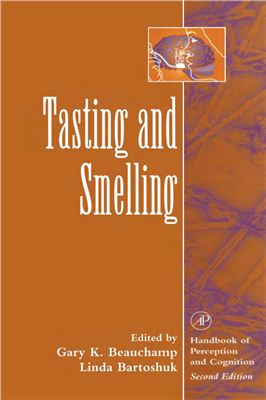Academic Press, 1997, Pages: 231
Handbook of Perception and Cognition, Second Edition
Tasting and Smelling presents a comprehensive overview to research on these two important modes of perception. The book offers a review of research findings on the biophysics, neurophysiology, and psychophysicsof both senses, as well as discussing the emotional component associated with taste and smell, and clinical disorders affecting each of these two senses. Tasting and Smelling answers how odors and flavors are perceived, why we have favorites, and what happens when our senses go awry. This book is of interest to the researcher in perception, cognition, or neurophysiology.
This book consists of six chapters covering a variety of topics on taste and smell research. It is not intended to be a complete overview of research in the chemical senses. The authors of these essays were encouraged to emphasize their own perspectives on important issues in the field. They were particularly asked to address unanswered questions and neglected research topics. Consequently, each of the chapters provides a point of view on an important and often controversial research area in the chemical senses.
Handbook of Perception and Cognition, Second Edition
Tasting and Smelling presents a comprehensive overview to research on these two important modes of perception. The book offers a review of research findings on the biophysics, neurophysiology, and psychophysicsof both senses, as well as discussing the emotional component associated with taste and smell, and clinical disorders affecting each of these two senses. Tasting and Smelling answers how odors and flavors are perceived, why we have favorites, and what happens when our senses go awry. This book is of interest to the researcher in perception, cognition, or neurophysiology.
This book consists of six chapters covering a variety of topics on taste and smell research. It is not intended to be a complete overview of research in the chemical senses. The authors of these essays were encouraged to emphasize their own perspectives on important issues in the field. They were particularly asked to address unanswered questions and neglected research topics. Consequently, each of the chapters provides a point of view on an important and often controversial research area in the chemical senses.

